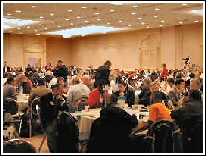FRtR > Outlines > The American Government > A Country of Many Governments > Town and Village Government
An Outline of American Government
A Country of Many Governments
Town and Village Government
*** Index * < Previous Chapter * Next Chapter > ***
Thousands of municipal
jurisdictions are too small to qualify as
city governments. These are chartered as towns and villages and
deal with such strictly local needs as paving and lighting the
streets; ensuring a water supply; providing police and fire
protection; establishing local health regulations; arranging for
garbage, sewage and other waste disposal; collecting local taxes
to support governmental operations; and, in cooperation with the
state and county, directly administering the local school system.
The government is usually entrusted to an elected board or
council, which may be known by a variety of names: town or
village council, board of selectmen, board of supervisors, board
of commissioners. The board may have a chairman or president who
functions as chief executive officer, or there may be an elected
mayor. Governmental employees may include a clerk, treasurer,
police and fire officers, and health and welfare officers.
 One unique aspect of local government, found mostly in the New
England region of the United States, is the "town meeting." Once
a year -- sometimes more often if needed -- the registered voters
of the town meet in open session to elect officers, debate local
issues and pass laws for operating the government. As a body,
they decide on road construction and repair, construction of
public buildings and facilities, tax rates and the town budget.
The town meeting, which has existed for more than two centuries,
is often cited as the purest form of direct democracy, in which
the governmental power is not delegated, but is exercised
directly and regularly by all the people.
One unique aspect of local government, found mostly in the New
England region of the United States, is the "town meeting." Once
a year -- sometimes more often if needed -- the registered voters
of the town meet in open session to elect officers, debate local
issues and pass laws for operating the government. As a body,
they decide on road construction and repair, construction of
public buildings and facilities, tax rates and the town budget.
The town meeting, which has existed for more than two centuries,
is often cited as the purest form of direct democracy, in which
the governmental power is not delegated, but is exercised
directly and regularly by all the people.
*** Index * < Previous Chapter * Next Chapter > ***
 One unique aspect of local government, found mostly in the New
England region of the United States, is the "town meeting." Once
a year -- sometimes more often if needed -- the registered voters
of the town meet in open session to elect officers, debate local
issues and pass laws for operating the government. As a body,
they decide on road construction and repair, construction of
public buildings and facilities, tax rates and the town budget.
The town meeting, which has existed for more than two centuries,
is often cited as the purest form of direct democracy, in which
the governmental power is not delegated, but is exercised
directly and regularly by all the people.
One unique aspect of local government, found mostly in the New
England region of the United States, is the "town meeting." Once
a year -- sometimes more often if needed -- the registered voters
of the town meet in open session to elect officers, debate local
issues and pass laws for operating the government. As a body,
they decide on road construction and repair, construction of
public buildings and facilities, tax rates and the town budget.
The town meeting, which has existed for more than two centuries,
is often cited as the purest form of direct democracy, in which
the governmental power is not delegated, but is exercised
directly and regularly by all the people.